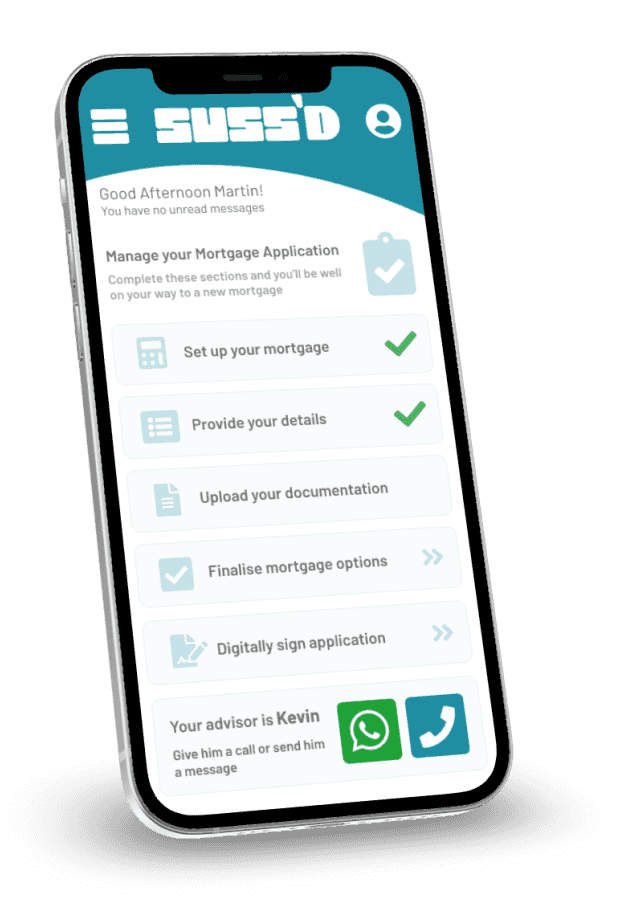
Easily Navigate Your Next Home Purchase with Our Mortgage Solutions
Find out how much your mortgage would cost
Simply adjust the figures to reflect your situation to get instant breakdown of your options
Work out
your mortgage!
Ready to
get started?

3 Easy Steps to get a Mortgage
- Check How Much You Can Afford
- Complete Our Really Easy Online Application Form
- Let Us Take Care of the Rest
What Happens After I Submit My Application?
We will ask you to upload some documents to your account
Once approval comes through you can use your interactive dashboard to satisfy any loan conditions
We're with you all the time with Instant Messaging
No paper so less hassle
Need More Help?
Frequently Asked Questions
Buying a home can be a daunting process. Everyone questions themselves when they are buying their first home. Is this a good time? Can I afford it? I don’t know how to get started? The list is endless.
The most important point to consider is whether you can afford to buy a home. When you take out a mortgage you are committing to making repayments for the duration of the loan which could be up to 30 years. If you miss any repayments then you could be at risk of losing your home. You can use our repayment calculators you can see what amount you can afford and also adjust the term to see how long you would like to pay this over.
A mortgage is a loan given by the bank to a customer or joint customers to buy a property. The loan is secured on the value of the property. Monthly repayments must be met. Otherwise, the property is at risk. In the event of a serious default, the bank could require the mortgaged house to be sold to repay the loan.
The Central Bank of Ireland has set limits on what people can borrow by placing limits on the Loan to Value (the amount you can borrow against the value of a property) and the Loan to Income (the amount you can borrow relative to your income). These are often referred to as the Central Bank Mortgage Measures.
The LTV Limit requires you to have a minimum deposit before you can get a mortgage. The size of the deposit depends on what category of borrower you are:
- First-time buyers need to have a minimum deposit of 10%
- Second and subsequent buyers need to have a minimum deposit of 20%
- Buy-to-let buyers need to have a minimum deposit of 30%
So if you are a first-time buyer and want to buy a house for €450,000, the rule means that you will need a deposit of €45,000 before you can borrow €405,000
Banks and lenders have the discretion to lend a certain amount outside these limits. These are often referred to as exemptions. In any one calendar year they are allowed to breach these limits in the following circumstances;
- Up to 5% of the value of mortgages issued to first-time buyers
- Up to 20% of the value of mortgages issued to second and subsequent buyers
- Up to 10% of the value of mortgages issued to buy-to-let buyers
The Loan to Income restricts the amount of money you can borrow to a maximum of 3½ times your gross income. So for example, a couple with a combined income of €100,000 can borrow up to a maximum of €350,000
Similar to Loan to Value Limits, Banks and Lenders have the discretion to lend a certain amount outside these limits. In any one calendar year they are allowed to breach these limits;
- Up to 20% of the value of mortgages issued to first-time buyers
- Up to 10% of the value of mortgages issued to second and subsequent buyer
Finally, it’s important to state that if you are thinking of switching your mortgage, the Central Bank’s rules don’t apply. However, most banks won’t let you switch if you are in negative equity and most will require you to have at least 10% equity in your home
The Central Bank of Ireland has set limits on what people can borrow by placing limits on the Loan to Value (the amount you can borrow against the value of a property) and the Loan to Income (the amount you can borrow relative to your income). You can read more about the Central Bank Mortgage Measures here
To get an exemption from these rules, the first thing to bear in mind is that you can usually only get an exemption under one of the lending rules. A bank will rarely allow you to breach both the loan-to-income limit as well as the loan-to-value ratio. It’s either one or the other
When a lender is considering whether to give you an exemption they will look at your creditworthiness and the quality of your mortgage application. Generally, Banks also tend to give exemptions to people on higher incomes, which means around €50,000 or above for a single Applicant and €75,000 and above for a joint application.
Finally, it’s important to state that if you are thinking of switching your mortgage, the Central Bank’s rules don’t apply. However, most banks won’t let you switch if you are in negative equity and most will require you to have at least 10% equity in your home.
Start with our calculator. This will help you find out how much you might be able to borrow or how much you might save by refinancing, without having to sign up or send any documents to us
When you're ready to explore your options in more detail, the first step is for you to sign up and answer a few questions on our site so that we can understand your circumstances; most importantly, your recent employment history, details of your income, deposit and your future mortgage preferences.
When we move on to submitting your application to a lender, we will need to supply your documents to the lender. We'll always make it clear exactly what we need and why. And all of these can easily be uploaded to your Suss’d Dashboard.
At any stage of the process, you can schedule a time to speak with us through our Whatsapp chat button or by organising a video call at a time that suits you